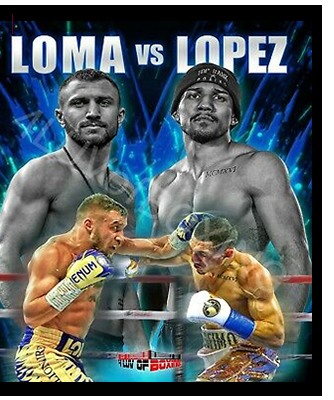Vasiliy Lomachenko, Teofimo Lopez & Corruption in Boxing
Vasiliy Lomachenko, Teofimo Lopez & Corruption in Boxing
"You can’t handle the truth." The corruption in combat sports goes straight to the top and unless you’ve got the backing of powerful politicians and federal law enforcement agencies it’s not in danger of going away anytime soon either. When the entire institution of professional boxing itself is crooked, and thus mixed martial arts because they're governed by the same sanctioning bodies, it’s going to take a Wyatt Earp or Elliot Ness type of individual to not only expose the corruption but to root it out like a Pitbull terrier in wrangling the sport away from the clutches of greed and criminality.
This past weekend, boxing fans were giddy with anticipation as a much anticipated lightweight championship showdown took place between the seemingly untouchable Vasiliy Lomachenko (14-2, 0 KOs) and the undefeated Teofimo Lopez (15-0, 12 KOs). “Before the action started, most expected that if Lopez could win, he would win by knockout. By one big punch,” writes Sports Illustrated's Greg Bishop in his October 18, 2020 article titled, “Lopez Backs Up His Dad’s Trash Talk to Complete His ‘Takeover’ and Claim the Undisputed Lightweight Championship.”
According to the report, “But that’s not what happened. Lopez controlled the fight, winning it with brains as much as brawn, elevating his so-called 'Takeover' to another level.” Continuing, the author goes on to write, “'I thought he fought a brilliant fight,' Bob Arum, chairman of Top Rank, said afterward. 'Everybody felt he would win by KO. But instead, he boxed the shit out of him for the first six rounds.'”
 Indeed, the general consensus across the professional boxing world is that Lomachenko simply took too long to get going. “Lomachenko, ordinarily a slow starter, was too slow this time,” reports The Associated Press in their October 18, 2020 USAToday.com article titled, “Teofimo Lopez becomes undisputed lightweight champ by earning unanimous decision over Vasiliy Lomachenko.” According to the report, “By the time the fight got competitive in the eighth round he was too far behind to come back.”
Indeed, the general consensus across the professional boxing world is that Lomachenko simply took too long to get going. “Lomachenko, ordinarily a slow starter, was too slow this time,” reports The Associated Press in their October 18, 2020 USAToday.com article titled, “Teofimo Lopez becomes undisputed lightweight champ by earning unanimous decision over Vasiliy Lomachenko.” According to the report, “By the time the fight got competitive in the eighth round he was too far behind to come back.”
Not surprisingly, if one was to go to any of the mainstream combat sports reporting hubs to read about the fight, you will find a similar message from the vast majority of the most respected names in boxing across the board as the official story and narrative is apparently Lomachenko just took too long to get going. Original ideas obviously in short supply in the world combat sports journalism. But to the discerning eye with over 25-years experience in observing legitimate combat sports contests, the subtleties between a slow starter and one carrying their opponent for the duration of the bout can be obvious and hard to miss.
With propositional bets in boxing long since being common place, that is bets placed on the specific outcomes of fights where the winners, duration of contest, the manner in which the fight is decided or even who wins what rounds manage to draw betting lines; the temptation for some fighters and their camps to cash in at the casino proves too much to bear as they give in to impropriety in pandering to the various betting houses and odds makers in attempting to cover the spread for wagers placed and bets made.
“You fix fights to make betting money. You fix fights to get a fighter a championship. You fix fights to maneuver a fighter up the ranks towards a championship fight. You fix fights to win, in order, again, to position someone strategically. You fix fights to lose, in order to get paid and you know, make betting coups," explains former boxing manager Charles Farrell in the 2016 award winning Benjamin Best documentary, "Dirty Games – The Dark Side of Sports."
According to Farrel, a veteran boxing manager who admits to fixing literally hundreds of fights, "The way you fix fights varies greatly. You fix fights by buying judges, that’s, you know, one easy way to do it. You fix fights by having the referee working for you so that if there’s any way that the ref can stop a fight in your guys favor, he does. You fix fights by colluding with the fighters, generally the loser, it’s almost always the loser. Winners almost never know that the fight is fixed,” explains Farrell.
But what we’re talking about is corruption on an epic scale, defrauding the public at the state level and activity so highly illegal that it would rock the industry to its very foundation if this information managed to make its way into the right hands and got exposed to the modern day congretion of fans in congressional hearings and other governmental oversight body committees.
“Lopez beats Lomachenko convincingly. After three rounds you know who your opponent is. Didn’t understand why Loma basically gave away most of the fight before getting into gear. Too late by then,” noted the former undisputed heavyweight champion Lennox Lewis on Twitter social media immediately following the fight. Lewis, a bright and articulate mind in boxing, perplexed by Lomachenko's performance.
“Lot of ‘Lomachenko started too late’ takes,” noted ESPN’s Max Kellerman on his own Twitter social media account in response to the fight. “Teo didn’t let him start early, controlling the fight with his jab, body shots and threat of the big right hand," explained Kellerman. "Loma roughed him up in the second half, but when it seemed like the fight could hang on the twelfth round, Teo won it big,” Kellerman wrote.
“Great fight by both fighters and hats off to Lopez,” wrote legendary trainer Teddy Atlas on his own Twiter social media account. “But please where, where do these judges get (their) scores from? And why?” asked Atlas. “Again, I have no problem with (the) fight going to Lopez, he earned it, but Loma did not deserve to hear the scores that wide,” Atlas would later go on to tweet.
The answer to how these score cards could be so wide and why very likely originating back to not only the promoters and commissions themselves but also the various odds makers and betting houses in control of the propositional wagers that the various players in the scheme attempt to cover in their betting spreads. And when you begin to take a look at exactly what is available to bet on, a troubling picture begins to emerge.
“If you really want to make a little extra bread,” writes author Joe Williams in his October 17, 2020 USA Today article titled, “Lightweight Title Fight: Vasiliy Lomachenko vs. Teofimo Lopez Jr. boxing odds, picks and best bets,” then you are advised to, “bet round group betting with Lopez in rounds 5-8 (+1400) and Lopez in rounds 9-12 (+1600) worth small-unit plays. Yes, you will lose one of the wagers, but if Lopez pulls the upset while winning in one of those four-round blocks, you will be well ahead," according to the report. "Taking Lopez on points (+900) is also worth betting lightly, too, although I do not expect it to go the distance. Still, it’s just too tempting to pass up.”
 With this information alone in mind, a possible explanation of how and why the judge’s score cards were so wide begins to come into focus in raising more questions than answers for Saturday nights main event showdown. Not only is it possible the fighters are angling to cover the spread in their propositional bets, but the judges could be doing the exact same thing both in collusion with the parties involved or even by themselves for other independent contractors. While the boxing experts in the media will attempt to explain the irregularities away as they often do as incompetence, a troubling picture begins to emerge of a criminal enterprise of systemic corruption inherent to the sport itself that even reaches into the highest echelons of governmental oversight and administration in the combat sports entertainment industry today.
With this information alone in mind, a possible explanation of how and why the judge’s score cards were so wide begins to come into focus in raising more questions than answers for Saturday nights main event showdown. Not only is it possible the fighters are angling to cover the spread in their propositional bets, but the judges could be doing the exact same thing both in collusion with the parties involved or even by themselves for other independent contractors. While the boxing experts in the media will attempt to explain the irregularities away as they often do as incompetence, a troubling picture begins to emerge of a criminal enterprise of systemic corruption inherent to the sport itself that even reaches into the highest echelons of governmental oversight and administration in the combat sports entertainment industry today.
Interestingly, according to a January 18, 2017 article from The Boxing Tribune titled, “Boxings Dirty Little Secret,” author Paul Magno writes, “A list of judges, pre-approved by the leader promoter, is taken by the sanctioning body to the commission (which is also often filled with buddies of the old cronies of the promoter) and, from that list, three judges are appointed for the bout.”
According to the report, "’Believe it or not, the promoters pay the judges,’ affirmed former two-division world champ and TV commentator Bobby Czyz in a 2009 Fight Hype interview." Czyz would go on to say that, "The judges are appointed by the commission and the promoter pays them. That’s part of his responsibility. Now, the sanctioning bodies, what they’ll do is say, ‘Any one of these 12 judges, we’ll accept’ because the sanctioning bodies have to accept the judges or they won’t sanction it as a title fight.”
A September 21, 2017 Los Angeles Times article titled, "A look inside boxing judging with an eye towards fixing it,” from author Lance Pugmire would later go on to follow up on the plague of judging issues in boxing, quoting California State Athletic Commission executive officer Andy Foster as stating, “’I have a pretty good idea of who my best people are, and I have no problem assigning them [to important fights] over and over,’ Foster said. ‘It becomes a feel based on facts. If a judge has a bad outing, you don’t want to put them right back out there right away, because sometimes judges are missing things — whether it be bad luck or bad angles. The best thing to equate it to is a hitting slump in baseball,'” said Foster.
In other words, there is a good ‘ol boy’s network of officials whom are hand picked and selected by the promoters and state athletic commission officials to consistently hand down what have proven to be dubious score cards in what could be described as an attempt to cover the spread on various proposition wagers and bets made on the outcome of the fights. An explanation which would go a long way in solving Teddy Atlas's dilemna with how wide the Lomachenko-Lopez scoring was.
With questionable judging score cards being a perpetual menace in professional boxing for decades now, the fact Foster not only believes he has an idea of who his best people are but also admits to going back to them “over and over” again is troubling and begs the question of whether or not the commission themselves bare any responsibility with the systemic judging problems in combat sports?
When you take into account Foster is also apparently operating behind the scenes as an unseen, fourth official who believes that he is the ultimate ajudicator of how the scoring should actually be done and as such is in a position of authority to discipline judges on what he describes as “slumps” in their decision making processes and a picture begins to emerge that further illustrates the role the commissions themselves play in the plague of poor judging decisions rendered in both boxing and mixed martial arts today.
In describing the evaluation process in which these judges are ultimately selected and trained, according to the Los Angeles Times report, "Beyond post-fight reviews, judges and referees engage in either private annual reviews or group seminars, trying to get to what Ratner referred to as a ‘commonality of philosophy … you might not agree with what the commission wants, but this is what we want.’”
Ratner, the former executive director of the Nevada State Athletic Commission who now "presides over UFC regulation matters" according to the report, should be striving to have judges accurately call the winners and losers of fights. If the commission is looking for anything else but calling the contests fairly and accurately they are in need of immedate corrective action. I don’t think that it’s a stretch to say that virtually all combat sports fans across the globe in search of legitimate, fair contests want the actual winners and losers of fights declared following the contests. Everyone that is but those looking to cover the spread on the various propositional wagers and bets they made on the fights and are theoreticall in danger of losing without intervention.
Which is the 800-gorilla in the room nobody is apparently willing to address in the combat sports entertainment industry today as score cards are regularly returned by judging officials in both boxing and mixed martial arts that cannot be explained by anything else but incompetence or corruption. And take a guess which word is nearly taboo in the mainstream combat sports media today and which is regularly used as a crutch by the various journalistic elite and pseudo-intellectual experts, themselves likely on the take, as a means to explain away the unexplainable?
If you’re a fan of professional boxing or mixed martial arts who wants to believe in the sanctity of competition and sport, then the plague of corruption in combat sports today is among as pressing of a topic as there is in the sport. currently. If the winners and losers of fights are not legitimate, then we’ve entered in the realm of professional wrestling where the outcomes of fights are predetermined and the matches themselves have devolved into little more than Kabuki theatre in route to covering the spread for wagers placed and bets made. Until a Wyatt Earp or Elliot Ness like figure enters the picture with some serious firepower behind them in an effort to wrestle the integrity of combat sports away from the clutches of criminality, there is a significant chance the most trusted sources in combat sports entertainment news are under the impression that "you simply can't handle the truth."





